(完整版)(整理)强烈推荐英语语法基础知识.doc
(完整word版)小学英语全部语法知识点整理

(完整word版)小学英语全部语法知识点整理小学英语全部语法知识点整理1.人称代词主格: I we you she he it they宾格: me us you her him it them形容词性物主代词:my our your her his its their名词性物主代词: mine ours yours hers his its theirs2.形容词和副词的比较(1) 普通在形容词或副词后+erolder ,taller, longer, stronger(2) 多音节词前+moremore interesting, etc.(3) 双写最终一具字母,再+erbigger fatter, etc.(4) 把y变i,再+erheavier, earlier(5) 别规则变化:well-better, much/many-more, etc.3.可数词的复数形式Most nouns + s abook –booksNouns ending in aconsonant +y - y+ ies a story—stories Nouns ending in s,sh, ch or x + es a glass—glasses a watch-watchesNouns ending in o+s or +es a piano—pianos a mango—mangoes Nouns ending in for fe - f or fe +ves a knife –knives a shelf-shelves4.别可数名词(单复数别变)bread, rice, water ,juice等。
5.缩略形式I’m= I a,you’re = you are,she’s= she is,he’s = he is it’s=it is, who’s =who is,can’t =can not,isn’t=is not 等。
完整版小学英语语法大全 .doc
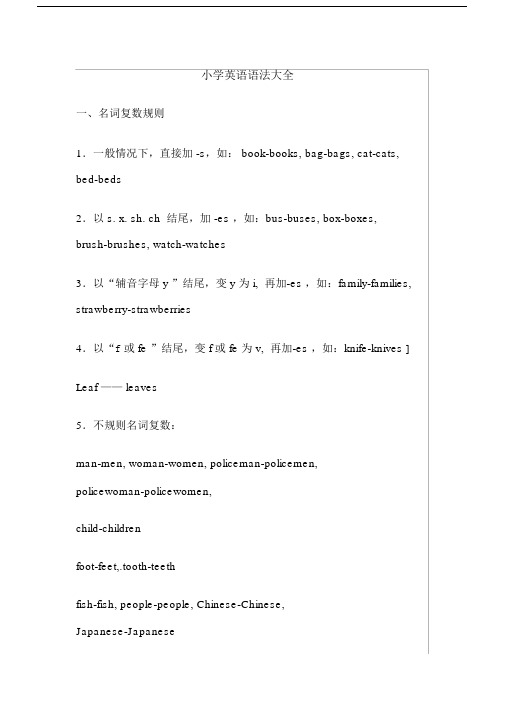
小学英语语法大全一、名词复数规则1.一般情况下,直接加 -s,如: book-books, bag-bags, cat-cats, bed-beds2.以 s. x. sh. ch 结尾,加 -es ,如:bus-buses, box-boxes,brush-brushes, watch-watches3.以“辅音字母 y ”结尾,变 y 为 i, 再加-es ,如:family-families, strawberry-strawberries4.以“f或 fe ”结尾,变 f 或 fe 为 v, 再加-es ,如:knife-knives ] Leaf —— leaves5.不规则名词复数:man-men, woman-women, policeman-policemen,policewoman-policewomen,child-childrenfoot-feet,.tooth-teethfish-fish, people-people, Chinese-Chinese,Japanese-Japanese写出下列各词的复数I _________him _________this ___________her ______watch _______child _______photo ________diary ______day________ foot________ book_______ dress ________tooth_______ sheep ______box_______ strawberry _____peach______ sandwich ______dish_______bus_______man______ woman_______二、一般现在时一般现在时基本用法介绍【No. 1 】一般现在时的功能1.表示事物或人物的特征、状态。
如:The sky is blue. 天空是蓝色的。
(完整版)(整理)强烈推荐英语语法基础知识.doc
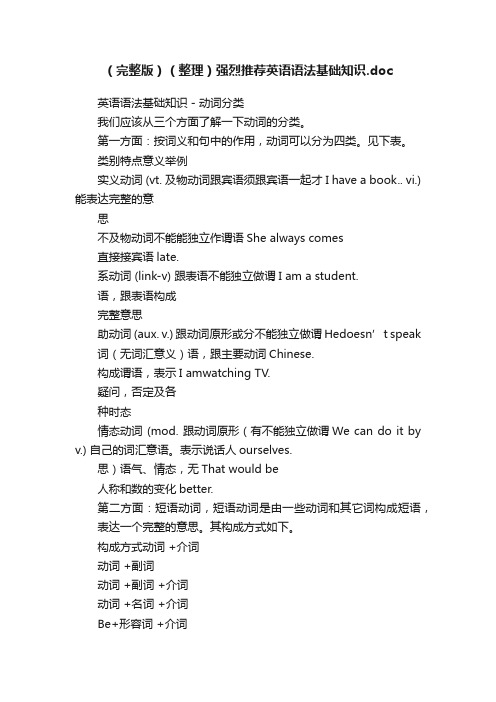
(完整版)(整理)强烈推荐英语语法基础知识.doc英语语法基础知识 - 动词分类我们应该从三个方面了解一下动词的分类。
第一方面:按词义和句中的作用,动词可以分为四类。
见下表。
类别特点意义举例实义动词 (vt. 及物动词跟宾语须跟宾语一起才I have a book.. vi.) 能表达完整的意思不及物动词不能能独立作谓语She always comes直接接宾语late.系动词 (link-v) 跟表语不能独立做谓I am a student.语,跟表语构成完整意思助动词 (aux. v.) 跟动词原形或分不能独立做谓Hedoesn’t speak 词(无词汇意义)语,跟主要动词Chinese.构成谓语,表示I amwatching TV.疑问,否定及各种时态情态动词 (mod. 跟动词原形(有不能独立做谓We can do it by v.) 自己的词汇意语。
表示说话人ourselves.思)语气、情态,无That would be人称和数的变化better.第二方面:短语动词,短语动词是由一些动词和其它词构成短语,表达一个完整的意思。
其构成方式如下。
构成方式动词 +介词动词 +副词动词 +副词 +介词动词 +名词 +介词Be+形容词 +介词复杂结构举例Look at, look afterGive up, put intoCatch up with, look down upon Take care of, pay attention to Be proud of, be afraid ofMake up one ’s mind, wind one ’s way第三方面:按动词的形式可以分为谓语动词和非谓语动词。
1、谓语动词形式意义举例人称与主语在人称一致I am reading now. 第一人称数与主语在数上一致He writes well. 第三人称单数时态表示动作发生的时间He wrote a letter to melast month. 过去时态主语是动作的发生者或语态者承受者We study English. 主动The road was filledwith rubbish. 被动语气说话人表达事实、要求、He has flown to愿望等America. 事实I wish I could fly tothe moon some day. 愿望2、非谓语动词形式意义用途举例不定式起形容词和名词可作主语、表语、 It takes me 20作用宾语、定语、状语 minutes to go toschool.动名词起名词作用作主语和宾语She likesreading.分词现在分起形容词、副词作作表语、定语、状The cup is broken 词用,表主动语、宾语补足语过去分起形容词、副词作The steam is seen词用,表被动rising from thewet clothes.中学生英语学习常见错误-- 动词[误]She laid down and soon fell asleep.[正]She lay down and soon fell asleep.[析]考试中常出现的是易混动词lay 放, lie去时、过去分词和现在分词变化如下:lay ( 放 ) laid , laid , laying (及物动词)躺, lie 说谎。
英语语法基础知识大全,全部整理好一定要收藏起来
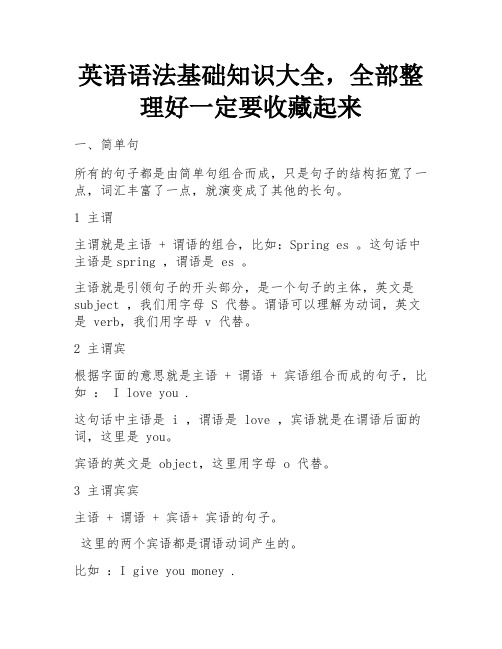
英语语法基础知识大全,全部整理好一定要收藏起来一、简单句所有的句子都是由简单句组合而成,只是句子的结构拓宽了一点,词汇丰富了一点,就演变成了其他的长句。
1 主谓主谓就是主语 + 谓语的组合,比如:Spring es 。
这句话中主语是spring ,谓语是 es 。
主语就是引领句子的开头部分,是一个句子的主体,英文是subject ,我们用字母 S 代替。
谓语可以理解为动词,英文是 verb,我们用字母 v 代替。
2 主谓宾根据字面的意思就是主语 + 谓语 + 宾语组合而成的句子,比如: I love you .这句话中主语是 i ,谓语是 love ,宾语就是在谓语后面的词,这里是 you。
宾语的英文是 object,这里用字母 o 代替。
3 主谓宾宾主语 + 谓语 + 宾语+ 宾语的句子。
这里的两个宾语都是谓语动词产生的。
比如:I give you money .这里的 you 和 money 都是 give 的宾语,give you 和 give money ,所以都是两个宾语。
4 主谓宾宾补主语 + 谓语 + 宾语+ 宾补的句子。
比如:It makes me happy .这里的 me 是 make 的宾语,但是 happy 不是 make 的宾语。
happy 是 me 的形容词,是一个宾补,全称为宾语补足语,起到了补充说明的作用。
注意:区分主谓宾宾和主谓宾宾补主谓宾中的两个宾语都是谓语产生的动作词,而主谓宾补语是宾语的形容词,与谓语无关。
5 主系表这里,系统代表系动词。
包含三个类别A be 动词: am is are was wereB 感官动词(五官)look 看起来sound 听起来smell 闻起来taste 尝起来feel 摸着....感觉......C 变化动词bee / turn / go / get / grow这里的表是代表表语,包括名词、形容词、介宾短语、不定式todo比如 you are beautiful 这句话中,you 是主语,are 是系动词,beautiful 是表语。
(完整版)英语语法学习资料

英语语法学习资料(完整版)第一讲名词⏹1.1名词的分类⏹名词可以分为专有名词(Proper Nouns)和普通名词 (Common Nouns),专有名词是某个(些)人,地方,机构等专有的名称,如Beijing,China等。
普通名词是一类人或东西或是一个抽象概念的名词,如:book,sadness等。
普通名词又可分为下面四类:1)个体名词(Individual Nouns):表示某类人或东西中的个体,如:gun。
2)集体名词(Collective Nouns):表示若干个个体组成的集合体,如:family。
3)物质名词(Material Nouns):表示无法分为个体的实物,如:air。
4)抽象名词(Abstract Nouns):表示动作、状态、品质、感情等抽象概念,如:work。
个体名词和集体名词可以用数目来计算,称为可数名词(Countable Nouns),物质名词和抽象名词一般无法用数目计算,称为不可数名词(Uncountable Nouns)。
归纳表格如下⏹ | |专有名词 | || 名 | | 个体名词 | || | |------------| 可数名词|| | | 集体名词 | || |普通名词 | | || 词 | | 物质名词 | || | |------------| 不可数名词|| | | 抽象名词 | |⏹) 以y 1结尾的专有名词,或元音字母+y 结尾的名词变复数时,直接加s变复数:如:two Marys the Henrysmonkey---monkeys holiday---holidays比较:层楼:storey ---storeys story---stories2) 以o 结尾的名词,变复数时:a. 加s,如: photo---photos piano---pianosradio---radios zoo---zoos;b. 加es,如:potato--potatoes tomato--tomatoesc. 均可,如:zero---zeros / zeroes3) 以f或fe 结尾的名词变复数时:a. 加s,如: belief---beliefs roof---roofssafe---safes gulf---gulfs;b. 去f,fe 加ves,如:half---halvesknife---knives leaf---leaves wolf---wolveswife---wives life---lives thief---thieves;c. 均可,如:handkerchief:handkerchiefs / handkerchieves名词复数的不规则变化1)child---children foot---feet tooth---teethmouse---mice man---men woman---women注意:与 man 和 woman构成的合成词,其复数形式也是 -men 和-women。
英语语法基础知识大全
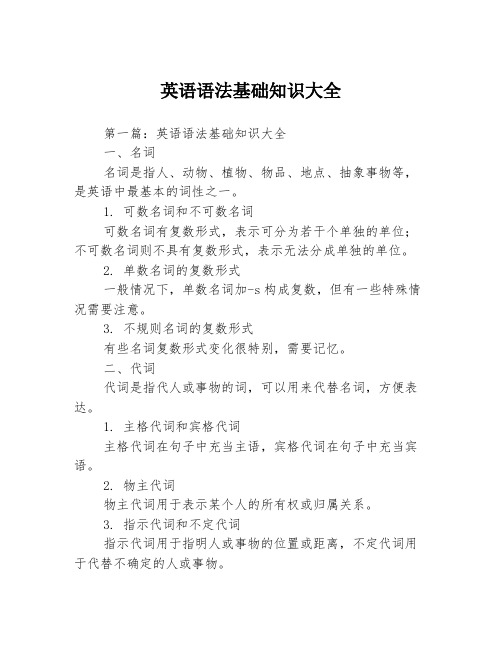
英语语法基础知识大全第一篇:英语语法基础知识大全一、名词名词是指人、动物、植物、物品、地点、抽象事物等,是英语中最基本的词性之一。
1. 可数名词和不可数名词可数名词有复数形式,表示可分为若干个单独的单位;不可数名词则不具有复数形式,表示无法分成单独的单位。
2. 单数名词的复数形式一般情况下,单数名词加-s构成复数,但有一些特殊情况需要注意。
3. 不规则名词的复数形式有些名词复数形式变化很特别,需要记忆。
二、代词代词是指代人或事物的词,可以用来代替名词,方便表达。
1. 主格代词和宾格代词主格代词在句子中充当主语,宾格代词在句子中充当宾语。
2. 物主代词物主代词用于表示某个人的所有权或归属关系。
3. 指示代词和不定代词指示代词用于指明人或事物的位置或距离,不定代词用于代替不确定的人或事物。
三、形容词和副词形容词是用来描述或限定名词的词,副词则是用来修饰动词、形容词或其他副词的词。
1. 形容词的用法和比较级形容词可以用来修饰名词并表示其性质、状态或特征,还可以用来进行比较。
2. 副词的用法和比较级副词用于修饰动词、形容词或其他副词,可以表示程度、时间、地点或方式等。
四、动词和时态动词是指表示动作、状态或存在的词。
时态是指动词所表示的时间。
1. 动词的时态和语态时态有现在时、过去时和将来时等,语态有主动语态和被动语态。
2. 动词的不定式和动名词不定式和动名词分别用于表示动作的目的或方式,还可以用作某些句子的主语或宾语。
五、介词和连词介词用于表示名词或代词与其他词的关系,连词则用于连接不同的句子或单词。
1. 常见介词常见的介词有at、in、on和to等,根据上下文不同使用不同的介词。
2. 连词的分类和用法连接词可以分为并列连词、从属连词和关系连词,用于连接不同的句子或单词。
六、形式和时态语法中的形式和时态常常会影响整个句子的结构和含义。
1. 形式的不同语法中的形式包括词性、时态、语态、人称和数等,可以根据不同的情况进行转换。
(完整版)英语语法重点整理
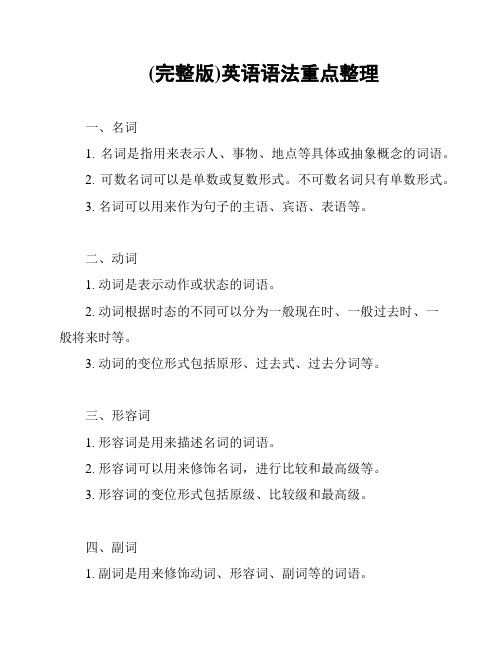
(完整版)英语语法重点整理一、名词1. 名词是指用来表示人、事物、地点等具体或抽象概念的词语。
2. 可数名词可以是单数或复数形式。
不可数名词只有单数形式。
3. 名词可以用来作为句子的主语、宾语、表语等。
二、动词1. 动词是表示动作或状态的词语。
2. 动词根据时态的不同可以分为一般现在时、一般过去时、一般将来时等。
3. 动词的变位形式包括原形、过去式、过去分词等。
三、形容词1. 形容词是用来描述名词的词语。
2. 形容词可以用来修饰名词,进行比较和最高级等。
3. 形容词的变位形式包括原级、比较级和最高级。
四、副词1. 副词是用来修饰动词、形容词、副词等的词语。
2. 副词可以用来表示时间、地点、方式、程度等。
3. 副词的变位形式一般不变。
五、介词1. 介词是用来表示两个词语之间的关系的词语。
2. 介词用来表达空间、时间、方向、原因、目的等关系。
3. 常见的介词有in, on, at, to, for等。
六、连词1. 连词是用来连接句子、短语或词语的词语。
2. 并列连词用于连接同级的词语或短语,如and, but, or等。
3. 从属连词用于引导从句,如if, because, when等。
七、冠词1. 冠词是用来限定名词的词语。
2. 冠词分为定冠词和不定冠词,如the, a, an等。
八、代词1. 代词是用来替代名词的词语。
2. 常见的代词有主格代词、宾格代词、物主代词、反身代词等。
九、句子结构1. 英语句子结构由主语、谓语、宾语等组成。
2. 句子结构可以包括简单句、复合句和并列句等。
十、语态1. 语态是用来表示动作执行者与承受者关系的词语。
2. 英语有主动语态和被动语态两种形式。
以上是英语语法的重点整理,希望对你有所帮助。
基础英语语法基础知识

基础英语语法基础知识(最新版)目录1.基础英语语法的概念与重要性2.基础英语语法的主要内容3.学习基础英语语法的方法与技巧4.基础英语语法在实际应用中的作用正文一、基础英语语法的概念与重要性英语语法是英语学习的重要组成部分,它是语言的基础,对于英语学习者来说,掌握基础英语语法是提高英语水平的关键。
基础英语语法主要包括英语单词、句子结构、时态、语态、词性、情态动词等方面的知识,这些知识是英语学习的基石,也是英语实际应用的必备技能。
二、基础英语语法的主要内容1.英语单词:英语单词是英语的基本单位,包括名词、动词、形容词、副词、代词、介词、连词和感叹词等。
学习英语单词,需要掌握单词的拼写、词义、用法等。
2.句子结构:英语句子结构包括主语、谓语、宾语、定语、状语和补语等,学习句子结构,需要了解句子成分的构成和作用,以及句子结构的类型。
3.时态:英语时态表示动作或状态发生的时间,包括一般现在时、一般过去时、一般将来时、现在进行时、过去进行时、将来进行时等。
学习时态,需要掌握时态的构成和用法。
4.语态:英语语态表示动作的执行者与动作之间的关系,包括主动语态和被动语态。
学习语态,需要了解语态的构成和用法。
5.词性:英语词性是指单词在句子中的功能和作用,包括名词、动词、形容词、副词、代词、介词、连词和感叹词等。
学习词性,需要掌握各种词性的特点和用法。
6.情态动词:英语情态动词表示说话人的态度、建议或要求,包括 can、may、might、must、should 等。
学习情态动词,需要掌握情态动词的用法和含义。
三、学习基础英语语法的方法与技巧学习基础英语语法,需要注重理论与实践相结合,可以通过以下方法提高学习效果:1.系统学习:通过英语语法书籍、网络资源等方式,系统学习英语语法知识。
2.练习:通过英语写作、口语表达等方式,实践所学语法知识。
3.创造语境:通过阅读、听力等方式,了解英语语法在实际应用中的用法。
4.及时复习:学习英语语法,需要及时复习,巩固所学知识。
英语语法基础知识大全
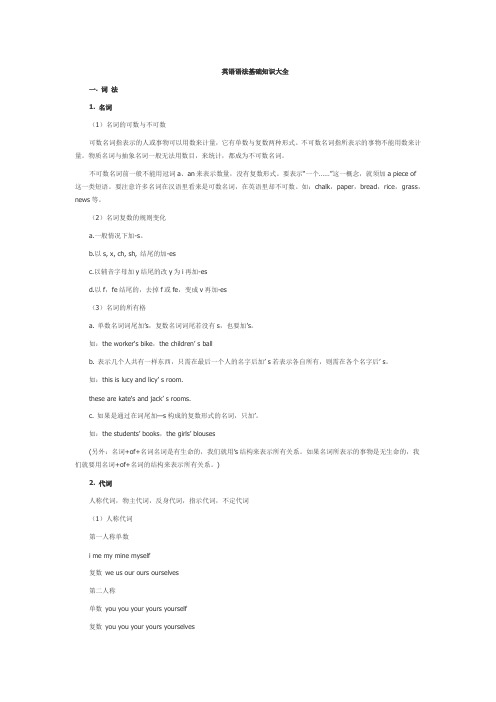
英语语法基础知识大全一. 词法1. 名词(1)名词的可数与不可数可数名词指表示的人或事物可以用数来计量,它有单数与复数两种形式。
不可数名词指所表示的事物不能用数来计量。
物质名词与抽象名词一般无法用数目,来统计,都成为不可数名词。
不可数名词前一般不能用冠词a、an来表示数量,没有复数形式。
要表示“一个……”这一概念,就须加a piece of这一类短语。
要注意许多名词在汉语里看来是可数名词,在英语里却不可数。
如:chalk,paper,bread,rice,grass,news等。
(2)名词复数的规则变化a.一般情况下加-s。
b.以s, x, ch, sh, 结尾的加-esc.以辅音字母加y结尾的改y为i再加-esd.以f,fe结尾的,去掉f或fe,变成v再加-es(3)名词的所有格a. 单数名词词尾加’s,复数名词词尾若没有s,也要加’s。
如:the worker‘s bike,the children’ s ballb. 表示几个人共有一样东西,只需在最后一个人的名字后加’ s若表示各自所有,则需在各个名字后’ s。
如:this is lucy and licy’ s room.these are kate‘s and jack’ s rooms.c. 如果是通过在词尾加—s构成的复数形式的名词,只加’。
如:the students’ books,the girls’ blouses(另外:名词+of+名词名词是有生命的,我们就用’s结构来表示所有关系。
如果名词所表示的事物是无生命的,我们就要用名词+of+名词的结构来表示所有关系。
)2. 代词人称代词,物主代词,反身代词,指示代词,不定代词(1)人称代词第一人称单数i me my mine myself复数 we us our ours ourselves第二人称单数you you your yours yourself复数you you your yours yourselves第三人称单数he him his his himselfshe her her hers herselfit it its its itself复数they them their theirs themselves(2)物主代词物主代词的用法:形容词性物主代词后面一定要跟上一个名词;名词性物主代词可作主语、表语、宾语。
(完整版)初中英语语法大全[知识点总结

英语语法大全初中英语语法学习提纲一、词类、句子成分和构词法:1、词类:英语词类分十种:名词、形容词、代词、数词、冠词、动词、副词、介词、连词、感叹词。
1、名词(n。
):表示人、事物、地点或抽象概念的名称.如:boy, morning, bag, ball, class, orange.2、代词(pron.):主要用来代替名词。
如:who, she, you, it 。
3、形容词(adj。
):表示人或事物的性质或特征.如:good, right, white, orange .4、数词(num。
): 表示数目或事物的顺序。
如:one, two, three, first, second, third, fourth。
5、动词(v。
): 表示动作或状态。
如:am, is,are,have,see 。
6、副词(adv.): 修饰动词、形容词或其他副词,说明时间、地点、程度等。
如:now, very, here, often,quietly, slowly.7、冠词(art。
.):用在名词前,帮助说明名词。
如:a, an, the。
8、介词(prep。
):表示它后面的名词或代词与其他句子成分的关系.如in, on, from, above, behind.9、连词(conj。
):用来连接词、短语或句子。
如and, but, before 。
10、感叹词(interj.。
)表示喜、怒、哀、乐等感情.如:oh, well, hi, hello。
2、句子成分:英语句子成分分为七种:主语、谓语、宾语、定语、状语、表语、宾语补足语。
1、主语是句子所要说的人或事物,回答是“谁”或者“什么”。
通常用名词或代词担任。
如:I’m MissGreen.(我是格林小姐)2、谓语动词说明主语的动作或状态,回答“做(什么)"。
主要由动词担任。
如:Jack cleans the room everyday. (杰克每天打扫房间)3、表语在系动词之后,说明主语的身份或特征,回答是“什么”或者“怎么样”。
(完整word版)英语语法基础入门
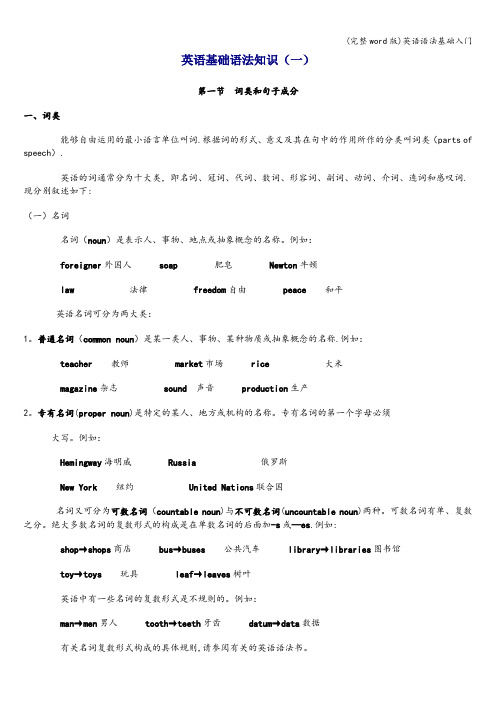
英语基础语法知识(一)第一节词类和句子成分一、词类能够自由运用的最小语言单位叫词.根据词的形式、意义及其在句中的作用所作的分类叫词类(parts of speech).英语的词通常分为十大类,即名词、冠词、代词、数词、形容词、副词、动词、介词、连词和感叹词.现分别叙述如下:(一)名词名词(noun)是表示人、事物、地点或抽象概念的名称。
例如:foreigner外国人soap 肥皂Newton牛顿law 法律freedom自由peace和平英语名词可分为两大类:1。
普通名词(common noun)是某一类人、事物、某种物质或抽象概念的名称.例如:teacher教师market市场rice大米magazine杂志sound声音production生产2。
专有名词(proper noun)是特定的某人、地方或机构的名称。
专有名词的第一个字母必须大写。
例如:Hemingway海明威Russia 俄罗斯New York 纽约United Nations联合国名词又可分为可数名词(countable noun)与不可数名词(uncountable noun)两种。
可数名词有单、复数之分。
绝大多数名词的复数形式的构成是在单数名词的后面加-s或—es.例如:shop→shops商店bus→buses 公共汽车library→libraries图书馆toy→toys玩具leaf→leaves树叶英语中有一些名词的复数形式是不规则的。
例如:man→men男人tooth→teeth牙齿datum→data数据有关名词复数形式构成的具体规则,请参阅有关的英语语法书。
(二)冠词冠词(article)放在名词之前,帮助说明该名词所指的对象。
冠词分为不定冠词(indefinite article)和定冠词(definite article)两种。
不定冠词为a/an,用在单数名词之前,表示某一类人或事物的“一个”。
a用在以辅音开头的名词之前,an 用在以元音开头的名词之前.例如:a hotel 一家旅馆 a chance 一次机会a double room一个双人间 a useful book一本有用的书an exhibition一次展览an honest man一个诚实的人冠词只有一个,既the,表示某一类人或事物中特定的一个或一些。
英语基础语法知识整理
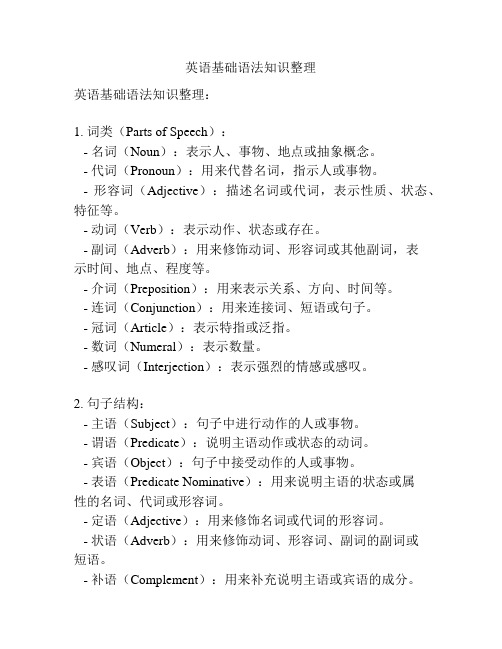
英语基础语法知识整理英语基础语法知识整理:1. 词类(Parts of Speech):- 名词(Noun):表示人、事物、地点或抽象概念。
- 代词(Pronoun):用来代替名词,指示人或事物。
- 形容词(Adjective):描述名词或代词,表示性质、状态、特征等。
- 动词(Verb):表示动作、状态或存在。
- 副词(Adverb):用来修饰动词、形容词或其他副词,表示时间、地点、程度等。
- 介词(Preposition):用来表示关系、方向、时间等。
- 连词(Conjunction):用来连接词、短语或句子。
- 冠词(Article):表示特指或泛指。
- 数词(Numeral):表示数量。
- 感叹词(Interjection):表示强烈的情感或感叹。
2. 句子结构:- 主语(Subject):句子中进行动作的人或事物。
- 谓语(Predicate):说明主语动作或状态的动词。
- 宾语(Object):句子中接受动作的人或事物。
- 表语(Predicate Nominative):用来说明主语的状态或属性的名词、代词或形容词。
- 定语(Adjective):用来修饰名词或代词的形容词。
- 状语(Adverb):用来修饰动词、形容词、副词的副词或短语。
- 补语(Complement):用来补充说明主语或宾语的成分。
3. 句子类型:- 陈述句(Declarative Sentence):陈述一个事实或情况。
- 疑问句(Interrogative Sentence):询问一个问题。
- 祈使句(Imperative Sentence):表达请求、命令或建议。
- 感叹句(Exclamatory Sentence):表示强烈的情感或感叹。
4. 时态(Tenses):- 一般现在时(Simple Present Tense):表示经常或习惯性动作。
- 一般过去时(Simple Past Tense):表示过去发生的动作或状态。
《英语语法基础知识大全_(全文)》.doc

英语语法基础知识第1课:1、be (是)动诃的用法:am接I; is接第三人称单数,即除you、I夕卜;are接表示多个人或事物,即复数。
(我是am,你是are, is连接它、她、他,单数is,复数are)。
2、not 是表示否定的词:不是的表达,am not, is not (isn' t), are not (£iren, t)a3、“一•个”和“几个”的问题:“一个”是a+名词;“多个”是名词后面加s。
4、以无音开头(如O、E等),前面的冠词用an。
第2课:1、及物动词与不及物动词的区别:及物动词后面接宾语;而不及物动词后面不接宾语。
女|[ I like ice cream , It hurts o2、主语是he、she、i(和单数名词时,动词要发生第三人称的变化,即加s。
3、否定的用法:在动词之询加do not或does not。
I、You和复数名词做主语吋,否定就用do not;凡是单数名称和he、she、it做主语,否定就用does note第3课1 > my (我的)、your (你的)、his (他的)、her (她的)、their (他们的)、our (我们的)、its (它的)+ 名诃,如my love, your love 。
2、..................................... 名词所有格形式为:名词+' S,表示“的”,如Sophie' s world, children? sDay,Japan' s tomorrow o 3、.................................................. 用名词+of+名词,一般用在无生命的名词上,表示“...................................... 的’’,The sound of music(音乐之声)。
英语语法基础知识大全基本语法
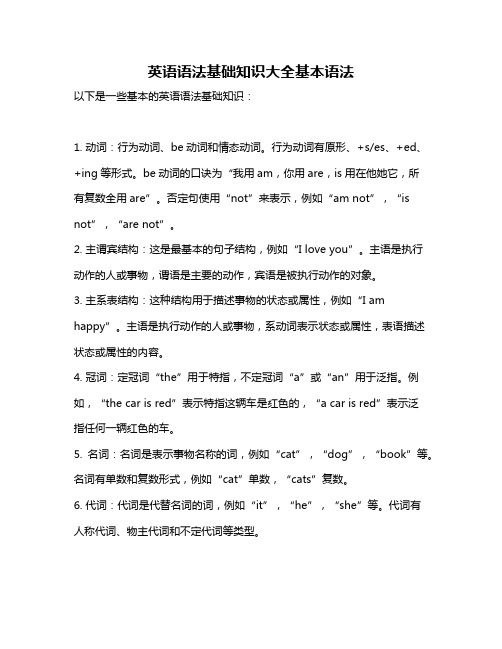
英语语法基础知识大全基本语法以下是一些基本的英语语法基础知识:1. 动词:行为动词、be动词和情态动词。
行为动词有原形、+s/es、+ed、+ing等形式。
be动词的口诀为“我用am,你用are,is用在他她它,所有复数全用are”。
否定句使用“not”来表示,例如“am not”,“is not”,“are not”。
2. 主谓宾结构:这是最基本的句子结构,例如“I love you”。
主语是执行动作的人或事物,谓语是主要的动作,宾语是被执行动作的对象。
3. 主系表结构:这种结构用于描述事物的状态或属性,例如“I am happy”。
主语是执行动作的人或事物,系动词表示状态或属性,表语描述状态或属性的内容。
4. 冠词:定冠词“the”用于特指,不定冠词“a”或“an”用于泛指。
例如,“the car is red”表示特指这辆车是红色的,“a car is red”表示泛指任何一辆红色的车。
5. 名词:名词是表示事物名称的词,例如“cat”,“dog”,“book”等。
名词有单数和复数形式,例如“cat”单数,“cats”复数。
6. 代词:代词是代替名词的词,例如“it”,“he”,“she”等。
代词有人称代词、物主代词和不定代词等类型。
7. 形容词:形容词是描述名词或代词性质或特征的词,例如“big”,“beautiful”,“happy”等。
形容词有原级、比较级和最高级形式。
8. 副词:副词是描述动词、形容词或其他副词的词,例如“fast”,“slowly”,“happily”等。
副词有地点副词、时间副词、方式副词等类型。
9. 介词:介词用于表示名词或代词与动词之间的关系,例如“in”,“on”,“under”等。
介词后面通常跟名词或代词。
10. 连词:连词用于连接两个或多个句子或分句,例如“and”,“but”,“or”等。
连词有并列连词和从属连词等类型。
以上是一些基本的英语语法基础知识,了解这些基础知识有助于更好地理解和运用英语语言。
(完整版)英语基础知识.doc

英基知一:英的基本成分有七种:主、、表、、定、状和。
主:可以作主的有名(如boy),主格代(如 I,she,he,they,we,you),指示代(如 this),不定式(如 to do sth),名(如 doing sth)和主从句。
The boy ishappy. She is friendly. Playing basketball is interesting.To go swimming with him is enjoyable. That he is ill is true. This is wrong. 1 :由构成,是英、化的主角,一般在主之后。
1.不及物( vi. )没有,形成主构,如: We come.2.及物( vt.)有,形成主构,如:They like Englih.3.系(系一般分两: be 是 , look,smell,taste,.feel.touch, keep,stay,seem等属一,表示情况; get, grow, become, turn,go,come,fall等属另一,表示化。
)后接表,构成主系表构,如:He is happy. The foodsmells delicious.: 可以作的有名(如 boy),格代(如 me,her,him,them,us,you),指示代(如 this),不定式(如 to do sth),名(如 doing sth)和从句。
I don’tlike the boy. I want to finish the work. I like this.I think that he is happy. I like playing football. You win him.表 : 可以作表的有名(如 boy),不定式(如 to do sth),名(如 doing sth),介短( He is in the classroom ),形容(如 good),方位副(如 The pen is here.)和表从句。
英语语法基本常识

英语语法基本常识
英语语法是一门研究英语语言结构和语义之间关系的学科。
以下是一些基本的英语语法知识:
1、词类和句子结构:英语语法包括多个层次,从最小的语素到最复杂的句子。
语素是构成单词的最小单位,而单词则构成了词组(phrase)、句子(sentence)和其他更复杂的文本结构。
句子可以进一步分为简单句和非简单句,如陈述句、疑问句、祈使句等。
2、句子成分:每个句子至少包含一个主语和一个谓语,它们通过动词(Verb)相连。
主语通常是一个名词或代词,而谓语则是动词。
此外,句子还可能包含其他成分,如宾语、表语、定语、状语等。
3、时态和语态:英语中有多种时态,用以描述发生的时间以及动作的执行者或经历的状态。
语态则涉及动作的执行者和承受者。
4、语气:语气是通过动词的形式体现出来的,比如可能、必要、意愿等不同的语气表达。
5、词性和语法范畴:英语中的词可以分为实义动词、名词、形容词、副词、代词、介词、连词等。
这些词根据其功能和形态有不同的分类,如动词可以根据是否需要被动形式或完成式进行分类。
语法范畴包括人称、性别、数、格、时体、语态、情态和语气。
6. 非谓语动词与分词:非谓语动词包括不定式和动名词,它们可以作为动词的补充信息或者作为介词的宾语。
分词包括现在分词和过去分词,它们通常在句子中被用作形容词或副词。
英语语法基础知识

英语语法基础知识英语语法入门基础篇大全篇一一、英语语句基本结构分析:主谓宾结构:主语:可以作主语的成分有名词(如boy),主格代词(如you),动词不定式,动名词等。
主语一般在句首。
注意名词单数形式常和冠词不分家!谓语:谓语由动词构成,是英语时态、语态变化的主角,一般在主语之后。
不及物动词(vi.)没有宾语,形成主谓结构,如:We come.宾语:宾语位于及物动词之后,一般同主语构成一样,不同的是构成宾语的代词必须是‘代词宾格’,如:me,him,them等例:The boy needs a pen.主语the boy,谓语needs(need的第三人称单数形式),宾语a pen.主系表结构:主语:同‘主谓宾’结构。
联系动词(Link verb):be动词(am,is,are,was,were,have been);其他联系动词如:become 成为,turn变成,go变。
其特点是联系动词与其后的表语没有动宾关系,表语多为形容词或副词,既,不可能是宾语。
表语:说明主语的状态、性质、等。
可为形容词、副词、名词、代词、不定式、分词。
当联系动词不是be,而其后是名词和代词时,多表达‘转变为’之意,注意与动宾关系的区别。
感官动词多可用作联系动词:look well/面色好,sound nice/听起来不错,feel good/感觉好,smell bad/难闻例:Tom is a boy.(Tom是个男孩)/主语为Tom,系词为be动词的第三人称单数is,表语为a boyThere be 结构:There be 表示‘存在有’。
这里的there没有实际意义,不可与副词‘there那里’混淆。
此结构后跟名词,表示‘(存在)有某事物’试比较:There is a boy there.(那儿有一个男孩。
)/前一个there无实意,后一个there 为副词‘那里’。
二、定语:定语是对名词或代词起修饰、限定作用的词、短语或句子,汉语中常用‘……的’表示。
(完整版)英语语法基础知识(适用于初高中衔接).doc
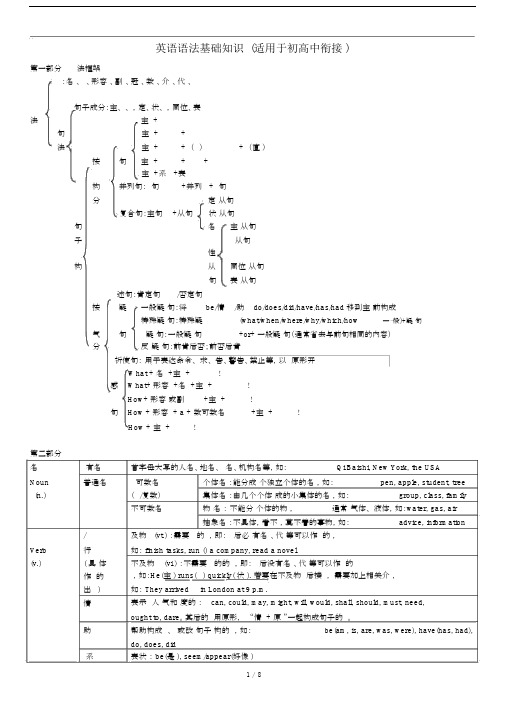
英语语法基础知识 (适用于初高中衔接 )第一部分法框架:名、、形容、副、冠、数、介、代、句子成分:主、、,定、状、,同位、表法主 +句主 ++法主 ++()+(直)按句主+++主 +系 +表构并列句:句+并列 +句分定从句复合句:主句+从句状从句句名主从句子从句性构从同位从句句表从句述句:肯定句/否定句按疑一般疑句:将be/情 /助 do/does/did/have/has/had 移到主前构成特殊疑句:特殊疑(what/when/where/why/which/how一⋯般)+疑句气句疑句:一般疑句+or+ 一般疑句(通常省去与前句相同的内容)分反疑句:前肯后否;前否后肯祈使句:用于表达命令、求、告、警告、禁止等,以原形开What + 名 +主 +!感What+ 形容 +名 +主 +!How+ 形容或副+主 +!句How + 形容 + a +数可数名+主 +!How + 主 +!第二部分名有名首字母大写的人名、地名、名、机构名等,如:Qi Baishi, New York, the USANoun 普通名可数名个体名:能分成个独立个体的名,如:pen, apple, student, tree (n.) ( /复数)集体名:由几个个体成的小集体的名,如:group, class, family 不可数名物名:不能分个体的物,通常气体、液体,如:water, gas, air抽象名:不具体,看不,莫不着的事物,如:advice, information / 及物 (vt.) :需要的,即:后必有名、代等可以作的,Verb 行如: finish tasks, run () a company, read a novel(v.) ( 具体不及物 (vi.) :不需要的的,即:后没有名、代等可以作的作的,如:He(主 ) runs( ) quickly( 状 ). 若要在不及物后接,需要加上相关介,出 ) 如: They arrived in London at 9 p.m.情表示人气和度的: can, could, may, might, will, would, shall, should, must, need,ought to, dare。
英语语法基础知识大全

英语语法基础知识大全英语语法基础知识大全第一节词类与句子成分一、词类能够自由运用得最小语言单位叫词。
根据词得形式、意义及其在句中得作用所作得分类叫词类(parts of speech)。
英语得词通常分为十大类,即名词、冠词、代词、数词、形容词、副词、动词、介词、连词与感叹词。
现分别叙述如下:(一)名词名词(noun)就是表示人、事物、地点或抽象概念得名称。
例如:foreigner外国人soap 肥皂 Newton牛顿law 法律 freedom自由 peace 与平英语名词可分为两大类:1。
普通名词(mon noun)就是某一类人、事物、某种物质或抽象概念得名称。
例如: teacher 教师 market市场rice 大米magazine杂志 sound 声音production生产2。
专有名词(proper noun)就是特定得某人、地方或机构得名称。
专有名词得第一个字母必须大写。
例如:Hemingway海明威 Russia 俄罗斯New York 纽约United Nations联合国名词又可分为可数名词(countable noun)与不可数名词(uncountable noun)两种。
可数名词有单、复数之分。
绝大多数名词得复数形式得构成就是在单数名词得后面加-s或-es。
例如: shop→shops商店bus→buses 公共汽车library→libraries图书馆toy→toys 玩具leaf→leaves树叶英语中有一些名词得复数形式就是不规则得。
例如:man→men男人tooth→teeth牙齿datum→data数据有关名词复数形式构成得具体规则,请参阅有关得英语语法书。
(二)冠词冠词(article)放在名词之前,帮助说明该名词所指得对象。
冠词分为不定冠词(indefinite article)与定冠词(definite article)两种。
不定冠词为a/an,用在单数名词之前,表示某一类人或事物得“一个”。
- 1、下载文档前请自行甄别文档内容的完整性,平台不提供额外的编辑、内容补充、找答案等附加服务。
- 2、"仅部分预览"的文档,不可在线预览部分如存在完整性等问题,可反馈申请退款(可完整预览的文档不适用该条件!)。
- 3、如文档侵犯您的权益,请联系客服反馈,我们会尽快为您处理(人工客服工作时间:9:00-18:30)。
英语语法基础知识 - 动词分类我们应该从三个方面了解一下动词的分类。
第一方面:按词义和句中的作用,动词可以分为四类。
见下表。
类别特点意义举例实义动词 (vt. 及物动词跟宾语须跟宾语一起才I have a book.. vi.) 能表达完整的意思不及物动词不能能独立作谓语She always comes直接接宾语late.系动词 (link-v) 跟表语不能独立做谓I am a student.语,跟表语构成完整意思助动词 (aux. v.) 跟动词原形或分不能独立做谓Hedoesn’t speak词(无词汇意义)语,跟主要动词Chinese.构成谓语,表示I amwatching TV.疑问,否定及各种时态情态动词 (mod. 跟动词原形(有不能独立做谓We can do it by v.) 自己的词汇意语。
表示说话人ourselves.思)语气、情态,无That would be人称和数的变化better.第二方面:短语动词,短语动词是由一些动词和其它词构成短语,表达一个完整的意思。
其构成方式如下。
构成方式动词 +介词动词 +副词动词 +副词 +介词动词 +名词 +介词Be+形容词 +介词复杂结构举例Look at, look afterGive up, put intoCatch up with, look down upon Take care of, pay attention toBe proud of, be afraid ofMake up one ’s mind, wind one ’s way第三方面:按动词的形式可以分为谓语动词和非谓语动词。
1、谓语动词形式意义举例人称与主语在人称一致I am reading now. 第一人称数与主语在数上一致He writes well. 第三人称单数时态表示动作发生的时间He wrote a letter to melast month. 过去时态主语是动作的发生者或语态者承受者We study English. 主动The road was filledwith rubbish. 被动语气说话人表达事实、要求、He has flown to愿望等America. 事实I wish I could fly tothe moon some day. 愿望2、非谓语动词形式意义用途举例不定式起形容词和名词可作主语、表语、 It takes me 20作用宾语、定语、状语 minutes to go toschool.动名词起名词作用作主语和宾语She likesreading.分词现在分起形容词、副词作作表语、定语、状 The cup is broken 词用,表主动语、宾语补足语过去分起形容词、副词作The steam is seen词用,表被动rising from thewet clothes.中学生英语学习常见错误-- 动词[误]She laid down and soon fell asleep.[正]She lay down and soon fell asleep.[析]考试中常出现的是易混动词lay 放, lie去时、过去分词和现在分词变化如下:lay ( 放 ) laid , laid , laying (及物动词)躺, lie 说谎。
它们的过lie ( 躺) lay , lain , lying (不及物动词)lie ( 说谎 ) lied , lied , lying[误]Please rise your hand.[正]Please raise your hand.[析] rise 是不及物动词,其后不能接宾语,如:The sun rises in the east. 而 raise 是及物动词。
[误]I like to swim very much, but I don't like swimming this afternoon.[正]I like swimming very much, but I don't like to swim this afternoon.[析]like作为"喜欢"讲时,可以接动名词也可以接不定式,但接动名词时多表达一种习惯性动作。
而接不定式则侧重于表达一次性、特殊性的动作。
但要注意的是like 与would 连用时则一定要接不定式,如:Would you like to go with me?再有一点要注意的是,like 作为介词 " 像 " 讲时,只能用分词作其宾语。
[误]Stop! Did you listen to a strange voice?[正]Stop! Did you hear a strange voice?[析]hear 的侧重点是听到、听见什么,而listen to 的倾向,如: listen! Do you hear someone calling help?有 look 与 see 。
的侧重点为听这样的词还它们的侧重点也不同,look 重于 " 看" 的倾向,而 see 重于看见没看见。
[误]Did you watch some film recently?[正]Did you see some film recently?[析]英语中 see 与 watch 各有不同的用处, see 用于看电影、剧目,而watch 用作看电视和看球赛。
[误]Look. A beautiful lamp hanged from the ceiling.[正]Look. A beautiful lamp hung from the ceiling.[析] hang 有两个含义,① " 挂" ,它的过去时与过去分词是 hung , hung;② " 绞刑 " ,这时它是规则动词,其过去式与过去分词则为 hanged ,hanged 。
[]How long can I borrow this book?[正]How long can I keep this book?[析] " 借 " 在英文中有三个,①借入,即 borrow,如:May I borrow some books from the library?② 借出,如:I can lend my bike to you.③借多久要用keep,因 borrow与lend都是截止性,而keep是延性。
如How long can I keep it?[]We have won your class.[正]We have beaten your class.[析]win 是及物,其后面的是比、争、品、金。
而 beat的,是人、、班等等,如:We won the game.[]I left my key.[正]I forgot my key.[正]I left my key at home.[析] leave 是 " 下 " ,其后一定要接地点状,而 forget 其后不要接地点状。
[]Oh! It's raining outside. Please bring the rain coat withyou.[正]Oh! It's raining outside. Please take this rain coat withyou.[析]bring" 来 " 如: Next time bring your little sister here.而 take" 走 " , fetch" 去某取什么回来 " ,如: Please fetch some coffee for us要熟的是在初中文中与take 有关的,如:take away拿走take back收回take down取下take off脱下take ⋯ out 拿出take place生take hold of 拿住take part in参加take a seat坐下take one's place替代take a look看看take one's turn流take a message捎信take care of照看take it easy着急take one's time慢慢来take one's temperature量体温[]The policeman reached his gun.[正]The policeman reached for his gun.[析]reach 作 " 到达 " 是及物,如:I reached the hotel at8 ∶ 30 但作 " 伸手去拿 " ,要用 reach for something。
作"到达"有 arrive (in+大地方)(at +小的地方 ) 和 get to.要注意的是与get 有关的有:get back回来get in收割get into 入get off下get on上get out出去get up起床get to到达get ready for=be ready for get on well with与人相处融洽get加比较级为变得如何,例如:get colder and colder.[误]This dictionary spent me five dollars.[正]This dictionary cost me five dollars.[析]英文中的 " 花费 " 有 4 个 spend, cost, take和pay,其中spend 与pay 所在句中的主语应为人,如: I spent two hours in doing my homework. I paid five dallars for the book.而cost 与 take 的主语则是事物,如: It takes me two years to finishthis book.[误] In summer I always sleep with the windows opened.[正] In summer I always sleep with the windows open.[正] I always sleep with the windows closed.[析]要注意 open 是动词也是形容词,而 close 则要用其过去分词作形容词。
